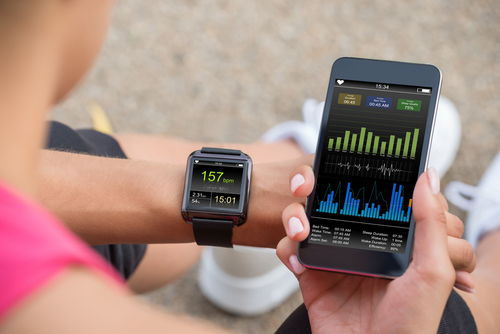Heart rate plays a vital role in enabling you to take your workout to the next level by introducing a few changes to the way you train your body and monitor it. Similar workout routines (i.e., duration of the distance swam) will bring better results once you plan it with the heart rate in mind. Today, we’ll discuss the advantages of a heart rate monitor and show you how heart rate monitoring can improve your heart health by making your workout more efficient.
Is Heart Rate Monitoring Necessary For You?
Of course! Let us tell you why… Your individual heart rate is truly the most vital, realistic, and accurate way to identify and measure your workout intensity in any given exercise you may be engaged in. Moreover, you can use this information to figure out on any given day whether your body is running at your peak levels or exceeding the current fitness level. When it comes to physical activity, you really get to know yourself. Tracking this information is crucial and valuable when assessing your overall physical condition and fitness level on going. According to Cardio Critic, using a medically approved EKG or ECG sensor is recommended for anyone who has a concern about their heart health. For instance, the Kardia Mobile ECG is smaller than a credit card, and it records a medical-grade EKG in less than 30 seconds. It can detect signs of atrial fibrillation and irregular heart rhythms with medically proven accuracy. You can then share these traces with your doctor for a more proactive treatment plan. Furthermore, Kardia enables you to track shortness of breath, palpitations, dietary habits, exercise, and sleep patterns. That said, let’s check out the advantages of using a heart rate monitor.
#1: Source of Constant Feedback
Ever heard the term “Awareness is power?” If so, then you know that wearing a heart rate monitor will have a precise evaluation and indication of your cardiovascular system’s condition while doing physical activity. Many of us believe that a hard workout session indicates a lot of sweating. That’s not always a reliable indicator, though. A heart rate monitor gives you objective feedback on the intensity of your exercise. Also, you can wear it while burning calories by taking part in non-structured workouts like housework, hiking, etc.
#2: Safety Exercise
If you have a heart rate monitor, you’ll help protect yourself from working out for too long and inadequately. Without this gadget, you won’t be able to tell when you need to stop or rest. The signals you receive on a heart rate monitor while doing an exercise make this an easy and obvious choice. Whenever your heart rate rises, you know it’s time to pause, rest, take a deep breath, and summarize the sets you’ve done so far.
#3: Enhanced Fitness Level
As you’re becoming more aerobically fit, odds are your heart rate will come down more quickly after a workout. With a heart rate monitor, you can monitor your recovery heart rate efficiently. Here’s a pro tip:
- Take note of your heart rate value after each workout
- Pause for 2 minutes
- Recheck the value
- And finally, subtract the first value from the second one
The difference should be more significant as you improve and become more fit. Recovery heart rate is, in fact, a marker for higher cardiovascular mortality, which is why it’s essential to monitor your heart rate recovery, whether you use a heart rate monitor or not. Changes in recovery heart rate, an unexpected boost in recovery time, could be a sign of overtraining. Luckily, a heart rate monitor makes it easy to measure your recovery heart rate. With more advanced heart rate monitors, you can even save the data every day or upload it to your training log.
#4: Make Quick Workout Adjustments
There are some who find they workout harder when they have the feedback heart rate monitors offer. As mentioned earlier, a heart rate monitor provides objective information you can use during a workout to adjust intensity. This means, when you take a quick look at your heart rate monitor and notice that your heart rate is lower than usual, you can make quick adjustments to get back in your zone. As you can see, a heart rate monitor ensures that you don’t waste time working out at an intensity that is too low. Similarly, you can check when your heart rate is getting too high and lower the intensity a little to avoid over-exercising. So, basically, a heart rate monitor acts as your personal coach. It will show you when to pull back and when to pump it up! This helps you determine what exactly you want to achieve and ensure the best outcome for the time you put into your workout plan, improving fitness safety too.
#5: Some Heart Rate Monitors Offer Additional Features
If you visit a few websites, you’ll see that some of the newer monitors have extra features you can use to track your overall fitness. For instance, with some heart rate monitors, you have the option to save the data to an online log to keep a record of your average heart rate, recovery heart rate, and peak heart rate on a regular basis. Some monitors come with features like calorie data and an interval timer, which allows you to set a target zone for your heart rate. So, whenever you are exercising outside your pre-determined zone, the monitor will start beeping. While having these cool features come with additional costs, being able to upload and analyze your heart rate data regularly will help you shape your workout.
Wrapping Up
Using a heart rate monitor is not the only way you can monitor workout intensity. It is, however, one of the easiest and safest ways to take good care of your heart health. Also, newer models monitor calories burned and offer additional features, as explained above. Overall, it’s a great way to ensure that you are working out a proper intensity to maximize your health benefits. Have any queries? Feel free to share your thoughts and recommendations with us in the comments below. Also, let us know which of the advantages mentioned above you found the most helpful.






